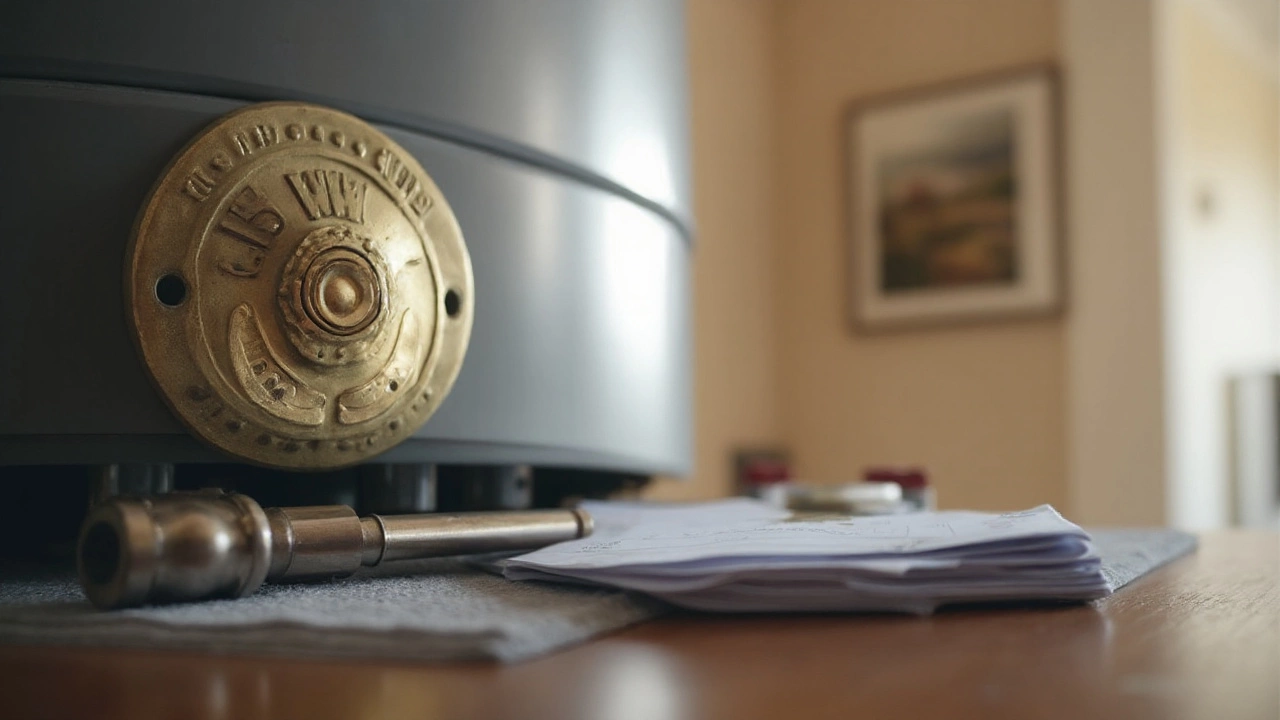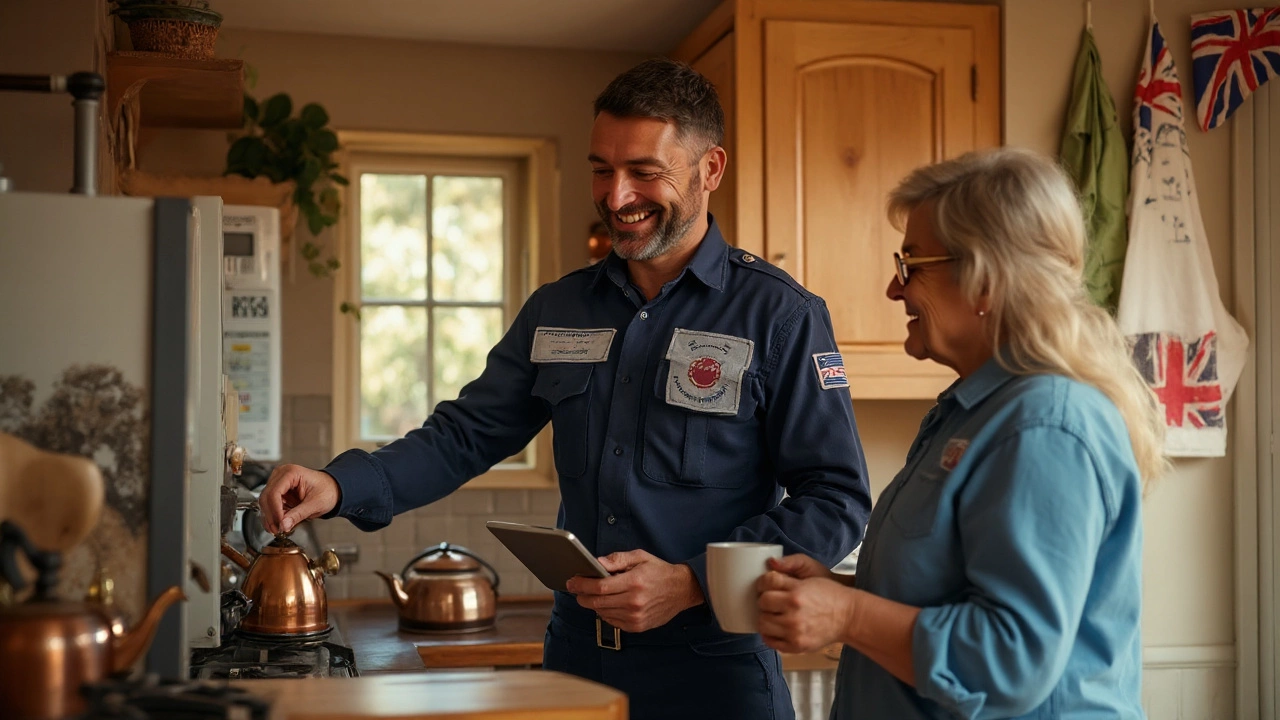Boiler Service Eligibility Checker
Boiler is a closed vessel that heats water or produces steam for central heating, hot water, and sometimes power generation. In the UK, a boiler must be inspected and maintained annually to stay safe, efficient, and legal.
Why Regular Service Matters
Skipping a yearly boiler service can lead to carbon monoxide leaks, rising energy bills, and voided warranties. A qualified technician checks the combustion chamber, pressure valves, and heat exchanger, ensuring the unit meets Building Regulations specifically Part G, which governs the safety of heating systems. The result? Safer homes and lower fuel consumption.
Who Is Legally Allowed to Service a Boiler?
The law is clear: only a Gas Safe Registered Engineer a tradesperson who holds a current Gas Safe Certificate of Competence can work on gas‑filled boilers. This certification is issued by the UK Health and Safety Executive (HSE) and must be displayed on any business card or invoice.
Other entities you might encounter include:
- Heating Contractor a company that offers a full suite of heating services, often employing multiple Gas Safe engineers
- Warranty Provider the boiler manufacturer or third‑party insurer that may require service by an authorized party to keep the warranty valid
- Homeowner the property occupant who arranges the service and is responsible for ensuring compliance
Key Certifications and Tests
When a Gas Safe engineer arrives, they’ll run a Combustion Safety Test a pressure‑gauge and emissions check that confirms the boiler burns cleanly and safely. They also issue a Service Report, which you can keep alongside your Energy Performance Certificate (EPC a document rating your home’s energy efficiency) for future property sales or rentals.
Choosing the Right Professional
Not all service offers are equal. Use this quick comparison to spot the red flags:
| Provider Type | Certification | Liability Insurance | Warranty Support | Typical Cost (NZD) |
|---|---|---|---|---|
| Gas Safe Registered Engineer | Gas Safe Card (valid) | Yes, minimum $2M | Full manufacturer warranty adherence | 150‑250 |
| General Handyman (no Gas Safe) | None | Often none | Warranty voided | 80‑130 |
| Heating Contractor (multi‑engineer team) | All engineers Gas Safe | Company policy covers | Warranty upheld if report filed | 160‑270 |
| DIY / Self‑service | None (illegal for gas work) | N/A | Warranty voided, legal risk | Variable (parts only) |
Notice how the only legal option that preserves your warranty and insurance is the Gas Safe Registered Engineer or a reputable Heating Contractor that employs such engineers.

What Happens During a Service Visit?
The engineer follows a standard checklist:
- Verify Gas Safe ID and insurance documents.
- Inspect visible pipework for corrosion or leaks.
- Perform a pressure test on the expansion vessel.
- Run the Combustion Safety Test and record CO/CO₂ levels.
- Clean the heat exchanger and check the fan for obstruction.
- Reset any fault codes and verify the thermostat operation.
- Provide a written Service Report and advise on any upcoming parts replacement.
This routine ensures the boiler continues to meet the Building Regulations and keeps your insurance policy intact.
Costs, Warranty, and Insurance Implications
While the price tag can vary, the trade‑off is clear: paying a certified professional protects you from costly breakdowns and legal penalties. Many manufacturers, like Viessmann or Worcester Bosch, explicitly state that only a Gas Safe engineer’s report counts towards warranty compliance.
If your homeowner’s insurance policy lists “boiler servicing” as a condition, you’ll need to supply the Service Report. Failure to do so can lead to a denied claim if a leak causes water damage.
DIY Limits - What You Can and Can’t Do
There are a few safe, legal tasks you can handle yourself:
- Bleeding air from radiators.
- Resetting the boiler’s emergency shut‑off.
- Checking the pressure gauge (keep between 1‑1.5bar when cold).
Anything involving gas lines, burners, or internal components must be left to a Gas Safe engineer. Attempting the work yourself not only breaches the law but also voids warranties and puts your family at risk of carbon monoxide exposure.
When to Call for Emergency Help
If you notice any of these signs, skip the schedule and call a Gas Safe engineer immediately:
- Unusual odours (gas or metallic)
- Odd noises (knocking, whistling)
- Frequent short‑cycling or failure to ignite
- Visible leaks or wet spots around the boiler
Most reputable services offer a 24‑hour hotline and will prioritize safety over cost.
Frequently Asked Questions
Do I need a Gas Safe engineer for a electric boiler?
No. Electric boilers don’t use gas, so they aren’t covered by Gas Safe regulations. However, you should still use a qualified electrician for any internal work and follow the manufacturer’s service schedule.
How often should I have my boiler serviced?
The legal minimum is once a year for gas‑fired boilers. Some high‑efficiency condensing models benefit from a six‑month check if they’re under heavy use.
Can a handyman legally fix a leaking pipe?
Yes, for non‑gas water pipework a plumber (licensed for water services) can repair leaks. The restriction applies only to gas‑related components, which must be handled by a Gas Safe engineer.
What should I ask a boiler service provider before hiring?
Confirm their Gas Safe registration number, ask for proof of liability insurance, check they can provide a written service report, and verify they’ll honor any manufacturer warranty you have.
Is carbon monoxide testing part of a standard service?
Yes. The Combustion Safety Test includes measuring CO and CO₂ levels. If the readings exceed legal limits, the engineer must fix the issue before the boiler can be used.
What happens if I don’t keep a service record?
You risk voiding the manufacturer’s warranty, breaching your insurance policy, and may be liable in case of an accident. It also makes it harder to prove the boiler was maintained if you sell the property.
Can I service a boiler myself if I have a technical background?
Even with technical know‑how, you cannot legally work on gas components without a Gas Safe certificate. Attempting it can lead to prosecution, fines, or imprisonment.

I am an expert in the services industry with a focus on appliance repair. My passion lies in understanding how things work and educating others in simple, engaging ways. This enthusiasm fuels my writing, where I delve into topics around appliance maintenance and troubleshooting. I aim to make these subjects clear and accessible to all readers.